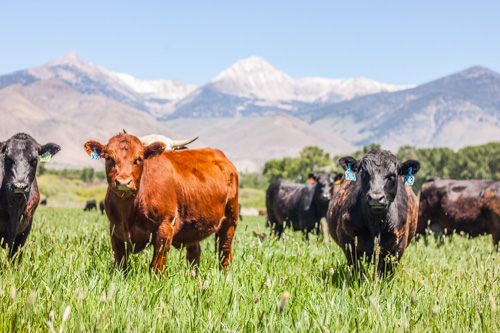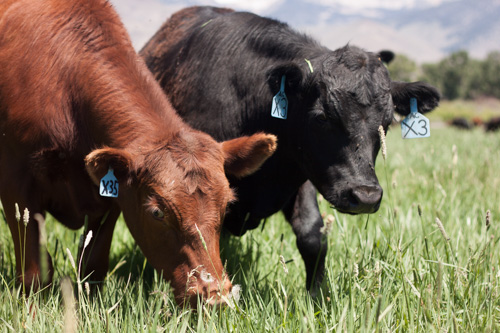I have been seeing the phrase “Beyond Organic” and similar phrases more frequently lately while browsing cyberspace to see what other grass fed producers have been doing. What does it mean?
Absolutely anything. Or nothing.
Let’s start with the word “beyond”. Defined by the dictionary it means “more than, surpassing or farther than”. That means that in order to go beyond, you have met the basic criteria of the thing you are going beyond.
Adding the word “organic” into the phrase then would mean that a producer who is or was certified organic has now gone further than that required in certification.
Let’s call beyond organic “BO” for short. I could easily call Alderspring BO for the habitat improvement work we do. The National Organic Program (NOP) rules clearly require things like biodiversity enhancement, animal welfare practices, soil enhancement, and wetland conservation. At Alderspring, we go beyond those requirements in building fences to protect fragile streambanks, graze some wetter areas only when the ground is frozen, and war against noxious weeds even on lands we do not own. The point for us on Alderspring is that there is so much we do to enhance and protect our portion of lands on God’s green earth that is not required in the “box” of the National Organic Program standards. We like to use the word stewardship to describe those things.
But is there a dark side to BO? Besides the kind that makes you unwelcome at parties?

Dark may be a little too strong, but the term “BO” is now used by some grass fed producers who are not certified organic for two apparent reasons:
First, it allows them to legally use the word organic in their web text. This way they can use the “O” word even in their headers when connected with the word beyond. USDA can’t do anything about it. Organic is a very regulated term, but in the context of “beyond” or “near”, a producer could legally use the term “organic” and get the search engine kudos from Google, Yahoo, or Bing to actually be found by some unsuspecting surfer looking for organic beef. Some of these even use the keyword “organic” illegally in their taglines to get folks to come to their storefronts. We have many customers who were misled by other grass fed beef producers using vague text and headers that led the customer to believe the beef they were purchasing was organic”¦until they received their packages with no “USDA ORGANIC” mark on them.
Second, some of these producers use BO to build their anti-organic certification platforms. There is some very misleading information presented in this context about organic certification.
They usually go on to say that they do not need big government to come in and regulate their farm or ranch, because they know better than USDA (read beyond as in beyond organic) about how to care for their pastures and livestock.
One producer that Caryl found online even went so far as to say that for animal welfare they do use several of these chemicals (pour-on insecticides in this particular case)–because of that, they are BO implying that those of us that are certified would just let animals suffer or even die.
Most of producers using the BO term say that they are doing one or more aspects of their management “beyond” the standard(s) of USDA; as a result they imply that they are “better” than certified organic.
If that is the case, the question begs an answer: “then why aren’t (or were) you certified?”
The fact is that I got tired of having to skip around that question when I was sampling beef in the stores we partner with before we finished our organic certification in 2005. I’d be grilling up a storm there, having a great time chatting with several folks at the sample station trying our delicious Alderspring beef. Every time I cooked, one of them invariably dropped the bomb:
“Is this beef Certified Organic?”
“Well–uh–no. We practice management that aligns with organic principles, and the beef is 100% grass fed. We raise it on our…”
Interrupting voice from a kind-faced woman by my George Foreman grill: “Then why don’t you get certified?”
Silence on my part while I’m trying to come up with something legit. Fact is that I know some of the ground I leased for pasture had Roundup sprayed on it before it came into my care. Or fertilizer. According to organic standards, these rented lands must be “clean” for three years prior to certification. So I tell them that I can’t be certified and give them the straight story.
Lost customer, and opportunity.
It took about 3 of these Q and A sessions for me to see that organic certification was a no brainer. Not easy, by any means, but an absolute no brainer if we wanted to serve our customers better. So we got it done in 2005 and have been certified organic ever since.
Agreed, we at Alderspring are not in favor of more government regulation, but USDA’s National Organic Program is the only game on right now that offers a third party certification package for producers to be audited to inspire consumer confidence. Indeed, it is imperfect, but it is the best we have right now. Sure, it has been lobbied hard by big organic biz to make some regulations softer, but…
It is the best we have right now (did I say that?).
The other cool thing about organic certification is that you have no options to use land that was sprayed or fertilized within the past 3 years. That playbook is closed. Permanently. Sure, you can cheat, but with a sharp inspector”¦you are dead. Forever.
And I have had those inpectors. I remember one guy I had who could smell a cheat before he drove on to their farm (those smelly ones are NOT organic now, thanks to this inspector). He spent most of his previous career in shipyards in foreign ports inspecting agricultural products that come in to the US from the third world, and has seen it all. He could write books on lie detection by body language.
Enter your average BO producer. No inspection to live (and die!) by, and land is hard to come by these days, and leases get lost on a landowner whim. County agents or your lease landowner sprays weeds at will where they see them, even on your private land (this has happened to us).
Without the 3rd party inspection, a farmer/rancher has no good economic reason to drop a lease when something non-organic happens to it. As a producer, they know their consumers will never know the difference (and remember, land is hard to come by). That raiser of grass fed beef may even be the one doing the Roundup application, or they may use external pour-on or oral insecticides for lice or worms; because they can still call it hormone and antibiotic-free. You can prey on your consumer’s ignorance about chemical use on land and cattle and call it BO.
That’s when BO becomes BS.
Take for example the chicken industry. Cage free or Free Range still can easily mean 10 chickens per square yard in a building of some 45000 square feet (just over an acre). That is over fifteen thousand birds in that acre! The dead ones show up as bones on the floor when they take the live ones out for slaughter.
I think those birds would have chosen the cage.
Likewise, words often become twisted in BO. One producer said that a consumer shouldn’t be satisfied with organic beef because most organic beef are raised in feedlots on organic corn, and that is why folks should buy his BO grass fed beef.
The fact of the matter is that many organic beef producers (like Alderspring’s) are 100% grass fed. It just so happens that the NOP standards lend themselves very well to a 100% organic AND grass fed operation, and confinement operations are not intended, at least in the spirit of the law.
So…next time someone says they are “Beyond Organic”, tell them that implies that they are or were certified organic, and indeed, they should be commended for taking the next step in stewardship of their land and animals.
Because “Beyond” in any other use of English implies that you have been there and exceeded.
Anything else may indeed be”¦
Read our article Savvy Beef Label Reader for a table comparing Alderspring, grass fed, organic, and natural beef.








Joel Huesby
Well said. Carry on!
sanders
Are there any restaurants in Boise or Meridian use you meats?
Caryl Elzinga
I’m sorry, but we don’t sell to any restaurants. You can buy our meat at the Boise Co-op.